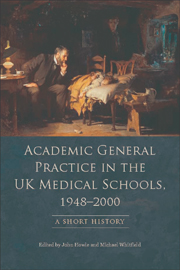Book contents
- Frontmatter
- Contents
- Preface
- Acknowledgements
- Abbreviations
- Timeline
- Introduction
- Dedication
- 1 The University of Aberdeen
- 2 The University of Dundee
- 3 The University of Edinburgh
- 4 The University of Glasgow
- 5 The Cardiff University School of Medicine
- 6 Academic General Practice in Ireland
- 7 The University of Birmingham
- 8 The University of Bristol
- 9 The University of Cambridge
- 10 The University of Exeter
- 11 The University of Leeds
- 12 The University of Leicester
- 13 The University of Liverpool
- 14 The University of Manchester
- 15 The University of Newcastle
- 16 The University of Nottingham
- 17 The University of Oxford
- 18 The University of Sheffield
- 19 The University of Southampton
- 20 The London Medical Schools
- 21 The University of St Andrews
- Appendix 1 Primary Care in the New Medical Schools
- Appendix 2 The SIFT/ACT Negotiations
- Appendix 3 An Overview
- Appendix 4 And Finally…
- Index
Appendix 3 - An Overview
Published online by Cambridge University Press: 05 August 2013
- Frontmatter
- Contents
- Preface
- Acknowledgements
- Abbreviations
- Timeline
- Introduction
- Dedication
- 1 The University of Aberdeen
- 2 The University of Dundee
- 3 The University of Edinburgh
- 4 The University of Glasgow
- 5 The Cardiff University School of Medicine
- 6 Academic General Practice in Ireland
- 7 The University of Birmingham
- 8 The University of Bristol
- 9 The University of Cambridge
- 10 The University of Exeter
- 11 The University of Leeds
- 12 The University of Leicester
- 13 The University of Liverpool
- 14 The University of Manchester
- 15 The University of Newcastle
- 16 The University of Nottingham
- 17 The University of Oxford
- 18 The University of Sheffield
- 19 The University of Southampton
- 20 The London Medical Schools
- 21 The University of St Andrews
- Appendix 1 Primary Care in the New Medical Schools
- Appendix 2 The SIFT/ACT Negotiations
- Appendix 3 An Overview
- Appendix 4 And Finally…
- Index
Summary
The year 2008 marked the sixtieth anniversary of the founding of the NHS. The first academic department of general practice in the modern era also dated from the ‘due date’ for the start of the NHS on 1 July, when the University of Edinburgh established its ‘academic general practice’ in the former Mackenzie House Public Dispensary within its department of social medicine. By 2000, there were twenty-nine departments of general practice in the traditional medical schools of the UK (the department in Trinity College Dublin has traditionally been included in this grouping). The history of their evolution and development has been interesting but not always straightforward; often a source of frustration but eventually one of achievement and satisfaction. This essay tries to tease out some of the issues that have had to be faced up to on the journey.
Timelines
Within the UK
Following the birth of the NHS in 1948, the highly critical Collings Report of 1950 led to the foundation in 1952 of the College of General Practitioners, one of whose first aims was to see established a department of general practice in every UK medical school. The Edinburgh department became independent in 1956 and its chair followed in 1963. Between 1970 and 1972 three other chairs were established in Scotland. Manchester (1972) led the way in England, but it took until 1995 for all schools to follow. From 1971 onwards regional (postgraduate) advisers were appointed in all UK regions, mostly with connections to medical schools through postgraduate Deans. In Exeter, a postgraduate chair was established in 1986.
- Type
- Chapter
- Information
- Academic General Practice in the UK Medical Schools, 1948-2000A Short History, pp. 135 - 142Publisher: Edinburgh University PressPrint publication year: 2011



